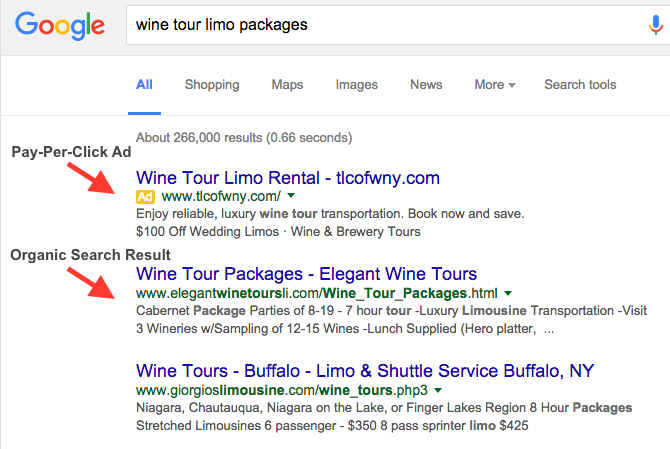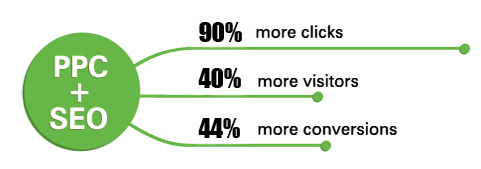Pay-Per-Click (PPC) and Search Engine Optimization (SEO) work to attract visitors to your site. PPC can deliver almost instant results and you pay on a per click basis, of course. SEO won’t give you those immediate results, but with work the results can be fantastic. The costs for this are in labor to build all the many signals the search engines need for you to rise into the traffic of the organic rankings.
Despite being essential marketing elements, they can have different priorities based on your time and goals. Often, PPC and SEO have been seen as separate elements, and they are in many fundamental ways, but businesses are realizing the value of a more unified approach. The fact that PPC and SEO depend on keywords means both disciplines should be handled through a similar lens. Here are 5 tips you can use to help PPC and SEO work together:
1. Get Content Ideas, Save Time and Money
Everyone knows that content is king for SEO purposes. Before you develop content around certain topics or keywords, it is recommended that you try testing it with PPC first. If it converts well in PPC, then it has a good chance to work for SEO, too. If it fails, you at least fail quickly with PPC, saving you valuable SEO resources and time that can be better invested elsewhere. Since content takes time to make an impact with SEO, PPC is cost-effective way to test ideas minus spending months and months in the name of waiting for results.

© Roman Milert | Time is Money
2. Research/Expand Keywords
Use Google Webmaster Tools and Google Analytics to see what keywords are fetching visits to your website. If those queries/keywords do not already exist in your PPC campaign, then consider adding them in and trying them out. Use the AdWords tools to help you determine whether or not the traffic volume is worth the cost. On the flip side, consider taking your most profitable and/or expensive paid terms and try prioritizing the ones you have the opportunity to rank organically. Start with the high quality and top converting ones. Odds are, those keywords are not just essential to your business but also will have a high likelihood of converting organically. Start developing content based on those keywords to increase your rankings in SERPS.
3. Identify Competitors
Pay-Per-Click reports in AdWords are capable of identifying new competitors, something you may not have even thought of. By having a look at an insight report for keywords, you can check how you rank up against competitors on similar keywords. For instance, a company that specializes in email marketing might realize they are also competing with CRM platforms on a numbers of keywords, despite not considering them as a direct competitor. This may open up new creative topics for their SEO content building. Additionally, there are tools out there that allow you to compare the keywords you have with those of competitors to see where you overlap or where you don’t. A deep dive into what the competition is doing is helpful for both PPC and SEO.
4. Leverage Compelling Copy
The meta descriptions and title tags that make up the organic results can also be views as ad copy. They have click through rates just like your PPC ads do. Lessons learned from your PPC ad copy can be applied to those meta descriptions to help improve both CTRs and conversion rates. Even though meta descriptions aren’t looked at for the search algorithms, it’s important that you focus on them. Through split testing your ad copy you can double or triple your CTRs. Imagine now doing the same with your meta descriptions — doubling or tripling the traffic that comes from an organic keyword.

5. Remember, Organic Links + Paid Links = Clicks
Studies have demonstrated that users have a tendency to click on your organic link upon seeing your paid link listed, and vice versa. Although this may seem counter-intuitive, the fact of the matter is that unless your organic link ranks within the top positions, it’s much harder to come by clicks. It’s even more unlikely you will get the traffic you are looking for if you are on the ranking’s first page, says a 2012 Google study. Hence, to ensure success of your business, it’s encouraged that you use both organic links and paid links. Additional Google studies have shown that adding a PPC add to even a top ranking SEO listing will result in more incremental traffic. Simply owning more real estate on your best keywords is an effective tactic. Use them together to dominate your niche.

The Bottom Line
Leverage the data you have from SEO and PPC to make both more effective. These five tips will help fine tune your PPC and SEO efforts for better return on your hard earned marketing dollar. If it all seems a bit overwhelming or something that you know you will put off, consider hiring and an experienced search marketing agency like Zero Company to do it for you.







